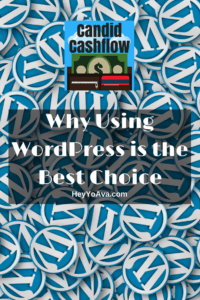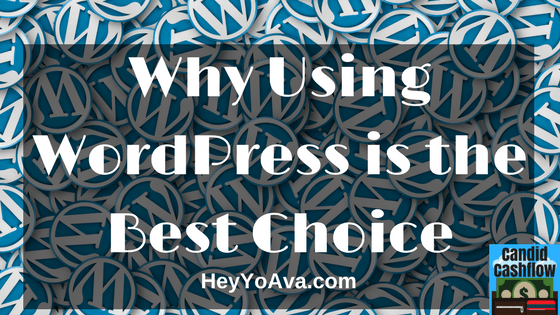Last Updated on September 28, 2022 by Ava

In a hurry, grab the PDF version of this post <<< -OR- Pin it to Read Later.
This episode is sponsored by Audible.
If you still haven’t found the perfect listen for your chill time or commute, try the world’s largest library of audiobooks.
Audible understands that a busy lifestyle doesn’t always allow for time to be well-read. They have your solution.
Grab their free trial and get 2 free books! Experience Audible for yourself today.
 I’d just like to throw in that as a self-publisher, Audible shoots me 25 free book codes each time I publish with the Audio Creation Exchange or ACX. I have often used these codes to further my online education, and you can do the same. There’s a ton of non-fiction on Audible…including books on WordPress. *hint hint
I’d just like to throw in that as a self-publisher, Audible shoots me 25 free book codes each time I publish with the Audio Creation Exchange or ACX. I have often used these codes to further my online education, and you can do the same. There’s a ton of non-fiction on Audible…including books on WordPress. *hint hint
Let’s Do a Giveaway!
That being said, I think it’s time for my first giveaway.
If you’re interested in some free audiobooks, I’m going to giveaway two 5-packs of free book codes. You do NOT have to have a paid Audible subscription to use these, but keep in mind, if you sign up for the free trial, you’ll get 7 books instead of 2.
If it’s available in audio format, you’re going to find it on Audible. They have every flavor from Gary V. to Grant Cardone to classics to 50 Shades.
So, let’s figure out this giveaway. 
This is completely spontaneous. I had not planned to do a giveaway when I sat down to write my podcast, so bear with me.
I’m going to run it for ONE week. Starting Wednesday, April 4, and determining 2 winners on Wednesday, April 11.
I’m not going to make you jump through a lot of hoops. To qualify, sign up to my email list. There are opt-in forms located at the top and in the right sidebar on every page of my website.
From this list of emails, I will select 2 winners on the 11th, completely randomly. You do not have to be present to win. I will send you an email to notify you of your forthcoming prize.
An Overview of WordPress
 WordPress was released in May of 2003, so it will be celebrating 15 years very soon. I first started using it in 2006, and I’ve had a WordPress site constantly since then although it hasn’t always been the same one.
WordPress was released in May of 2003, so it will be celebrating 15 years very soon. I first started using it in 2006, and I’ve had a WordPress site constantly since then although it hasn’t always been the same one.
In these last 12 years, I’ve learned a lot, but I also came to the table with background knowledge. I used LiveJournal and Blogger in the past, and that gave me kind of a basis for my understanding of how a blogging platform like WordPress functions.
Let me interject here, and say that WordPress often gets dismissed as just being a blogging platform, but it is so much more than that. We’ll get more into that a little later.
Since its inception, it has gone on to power some of the more popular sites on the web like Mashable and TechCrunch. As of this writing, it powers up to 29% of the websites online worldwide. That’s more than a quarter of all the websites out there.
I work pretty much exclusively with WordPress, and I’m going to tell you why in this broadcast, so don’t go anywhere!
Why Should You Choose WordPress?
Maybe you shouldn’t. It really depends on what you want to do online and how far you want to take your site.
If you’re just dabbling, try something free like Wix, Weebly, WordPress.com, or Blogger.
If you think that your dabbling could possibly turn into more, go with WordPress.com. At least you’ll have a leg-up on how to use self-hosted WordPress.
Yes, there are 2 WordPresses.
First, there’s WordPress.com which is the free blog arm where you get a blog on a subdomain like yourblog.wordpress.com. Not ideal, but fine for learning. You can also redirect a domain like yoursite.com to a free WordPress blog.
Second, you have WordPress.org. This is the self-hosted software version of WordPress that is also free. In order to utilize it, you need a webhost where you can install the software. Most webhosts have one-click installs of WordPress that make this really easy.
If you are serious about getting online and creating a sustainable business, I wholeheartedly recommend the second option.
Learning Curve Ahead
If you’ve never used a blogging platform of any kind before, there is going to be a learning curve with WordPress.
It is SO much easier to use now than it used to be. When I started 12 years ago, you had to upload your plugins and themes to WordPress using FTP. Some genius eventually built these installs into the Dashboard.
Still, the WordPress Dashboard can be an intimidating place.
As a bonus to accompany this episode, I have some how to WordPress stuff that I wrote for Steemit which I will compile into an eBook for you. Be sure to grab the show notes at HeyYoAva.com/Episode19 for a link!
 Types of Websites You Can Build with WordPress
Types of Websites You Can Build with WordPress
It might be easier to list the types you can’t build.
I’m just going to briefly talk about the types of sites I’ve built with WordPress, and perhaps a few I haven’t, but know are possible.
Blogs are a given, but I’ve also built static websites with WordPress that do not include a blog. Because WordPress has 2 different content editors for Posts and Pages, you can create a website with only Pages, and just not add the posting page to your navigation. So, you don’t have to be a blogger to have a WordPress website. It works fantastically for small business.
I’ve built ecommerce sites on WordPress using their own plugin called WooCommerce. I’ve also used a platform called Ecwid to build out stores and shopping carts on WordPress. They both run quite effectively and get the job done. Both of them have free features, as well as paid ones. They both build a good-looking online store.
You can create a membership site with WordPress and have private areas that only members can view. You can place your membership easily behind a pay wall and generate monthly revenue from your premium content.
I’ll include an image gallery of some of the sites I’ve created with WordPress at the end of the blog post corresponding with this episode.
Finally, I’ve built forums on WordPress as well where users could gather and discuss topics surrounding a common theme. There’s just not much you can’t do with a WordPress site.
I do not even endeavor to know it all.
WordPress is Bad for Small Business?
In researching for this episode, I found a few naysayers. That is just the lay of the land when you’ve been around as long as WordPress.
I wanted to address the points in one particular article JPWDesignStudio.com one at a time. I’m going to paraphrase…
- WordPress developers will complicate your customizations and cost you a lot of money for the website you want.
My rebuttal:
Don’t make your website ideas too complicated. If you want a completely custom experience, then you can expect to pay for that. If you’re just going for a solid web presence and clean website, you don’t need to hire a developer.- WordPress costs too much to maintain.
My rebuttal:
You’re kidding, right? My website is like $200 per year.Some of the other claims are that WordPress sites break every few months, need constant fixes and updates, it’s open source, so there’s no support, and that you need to be prepared to hire multiple developers.Wow. Okay, first, WordPress updates their core stuff every few months or so. Depending upon your webhost, these updates can be manual or automatic. I’ve never had a WordPress site “break”. I’ve had sites run for months, even years without being updated. There is a TON of documentation about WordPress online, and that has been true from the start. I’m completely self-taught, and I basically Googled my way through learning WordPress. I’ve never hired a developer.- You won’t be able to make changes to your site without tons of training.
My rebuttal:
There is a learning curve. It’s going to depend on your personal experience and knowledge how quickly or how slowly you’re able to get the hang of it. That’s the honest truth.- WordPress breaks all the time.
My rebuttal:
I’ve never had WordPress break in all my 12 years working with for both myself and clients.If it does break, I know how to restore from backup. Do these people not have backups? The article goes on to say that you can expect to hire a developer and it cost between $300 and $1000 quarterly to maintain your WordPress site.On what planet?Maintaining WordPress monthly is a few clicks, not completely hand-coding a great, unknown fix.- WordPress is easy to hack.
My rebuttal:
No, WordPress is just so widely used that it gets hacked the most often. If you secure your site properly, you don’t have anything to worry about. It just takes a little common sense and a great plugin called WordFence.- Other platforms work just as well for SEO as WordPress.
My rebuttal:
Okay. And?- It’s bad for small business.
My rebuttal:
You said that already. What? You couldn’t come up with a different point?WordPress is GREAT for small business because it puts you on the level with the big businesses who use it like Disney, BBC, Sony, Facebook, Microsoft, and way more than I can list here.All the entrepreneurs that I know use WordPress for their small business. I use it, and that’s good enough for me!
How Much Can You Expect to Pay for a WordPress Site?
It really depends on where you shop and what you need.
As I stated a few minutes ago, my website costs me about $200 per year give or take. My expenses include:
- My domain at $11 per year
- Hosting at $16.95 per month – this includes hosting for several client sites where I recoup some of this monthly fee
- Time for maintenance
WordPress itself is completely free to use.
If you use third party features like themes and plugins, this is where you can expect to pay more; however, it’s not a requirement. There are workarounds for everything.
For example, let’s say you install a theme, but in order to get Social Media icons, you have to buy the premium version. There are actually plugins that can add this functionality free.
If you need something completely custom, you can expect to pay a good amount for it, but if you just need basic stuff, it should cost you next to nothing.
You do not need a WordPress developer for a basic site and to secure, backup, and maintain your WordPress site. Anyone charges hundreds for that kind of service is a rip-off artist. I provide this service for $9.99 per month per site to several of my clients.
That’s a Wrap
In my opinion, WordPress is just a no-brainer for anyone looking to build a sustainable business online. It’s professional, and it can handle anything you throw at it. If you decide to expand in the future, add an eStore, add a membership, or anything you can imagine, WordPress can handle it.
If you’re interested in a WordPress website for yourself, you can check out more information about it at HeyYoAva.com/using-wordpress. There’s a button on that page where you can send me a direct email if you have any questions regarding WordPress, how to use it, and the services I offer in relation to WordPress.
Remember, there will be a link in the show notes with a free eBook of WordPress training yours for the taking. Be sure to grab those at HeyYoAva.com/Episode19.
Don’t forget to get your entry in for the giveaway by signing up for my email list. I’m not currently sending out a newsletter anymore. I’m still thinking about what I want to send out and how often.
If you enjoyed this episode of The Candid Cashflow Podcast, I hope you will consider subscribing. You can do so in your favorite app at HeyYoAva.com/CandidCashflow. I release a new episode each Wednesday.
Until next time…turning your passion into cashflow!
[Best_Wordpress_Gallery id=”4″ gal_title=”Websites I Have Built and/or Maintain”]

